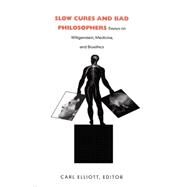Slow Cures and Bad Philosophers
, by Elliott, Carl; Edwards, James C. (CON); Churchill, Larry R. (CON); Nelson, James Lindemann (CON)- ISBN: 9780822326465 | 0822326469
- Cover: Paperback
- Copyright: 6/1/2001
Slow Cures and Bad Philosophers uses insights from the philosophy of Ludwig Wittgenstein to rethink bioethics. While Wittgenstein produced little formal writing on ethics, this volume shows that, in fact, ethical issues permeate the entirety of his work. The scholars whom Carl Elliott has assembled in this volume pay particular attention to Wittgenstein's concern with the thick context of moral problems, his suspicion of theory, and his belief in description as the real aim of philosophy. Their aim is not to examine Wittgenstein's personal moral convictions but rather to explore how a deep engagement with his work can illuminate some of the problems that medicine and biological science present.As Elliott explains in his introduction, Wittgenstein's philosophy runs against the grain of most contemporary bioethics scholarship, which all too often ignores the context in which moral problems are situated and pays little attention to narrative, ethnography, and clinical case studies in rendering bioethical judgements. This kind of anonymous, impersonal, rule-writing exercise in which health care workers are advised how to behave is what this volume intends to counteract. Instead, contributors stress the value of focusing on the concrete particulars of moral problems and write in the spirit of Wittgenstein's belief that philosophy should be useful. The specific topics they discuss include the concept of "good dying," the nature of clinical decision making, the treatment of neurologically damaged patients, the moral treatment of animals, and the challenges of moral particularism.Inspired by a philosopher who deplored "professional philosophy," this work brings some startling insights and clarifications to contemporary ethical problems posed by the realities of modern medicine.






